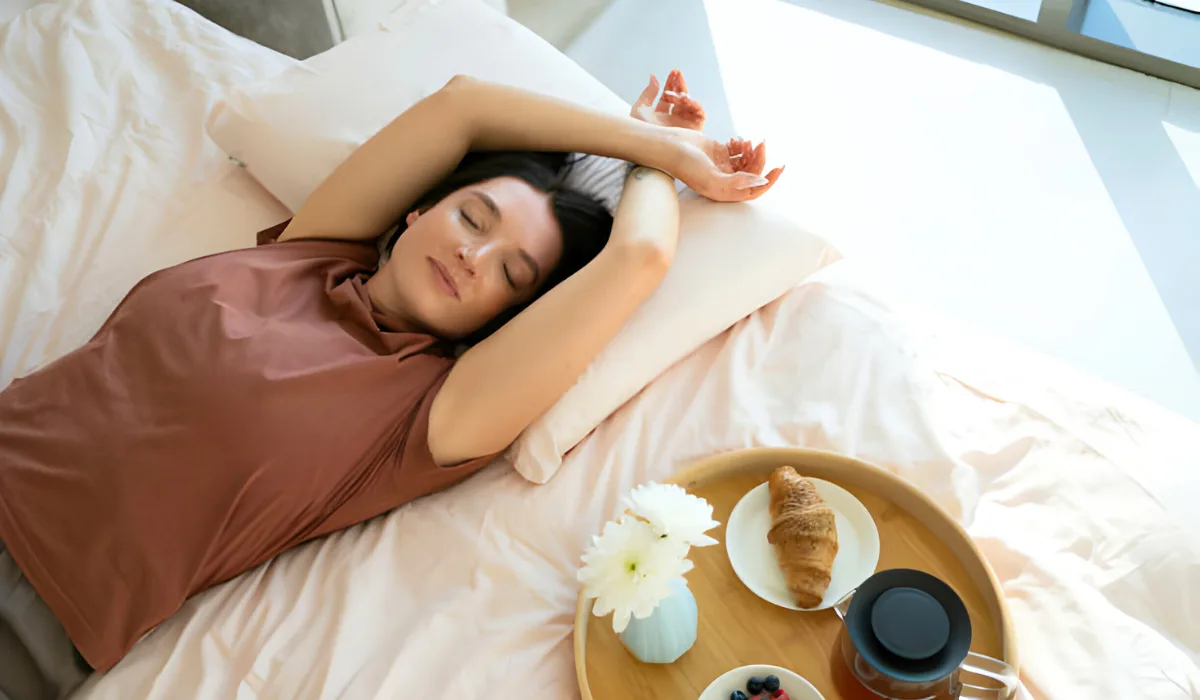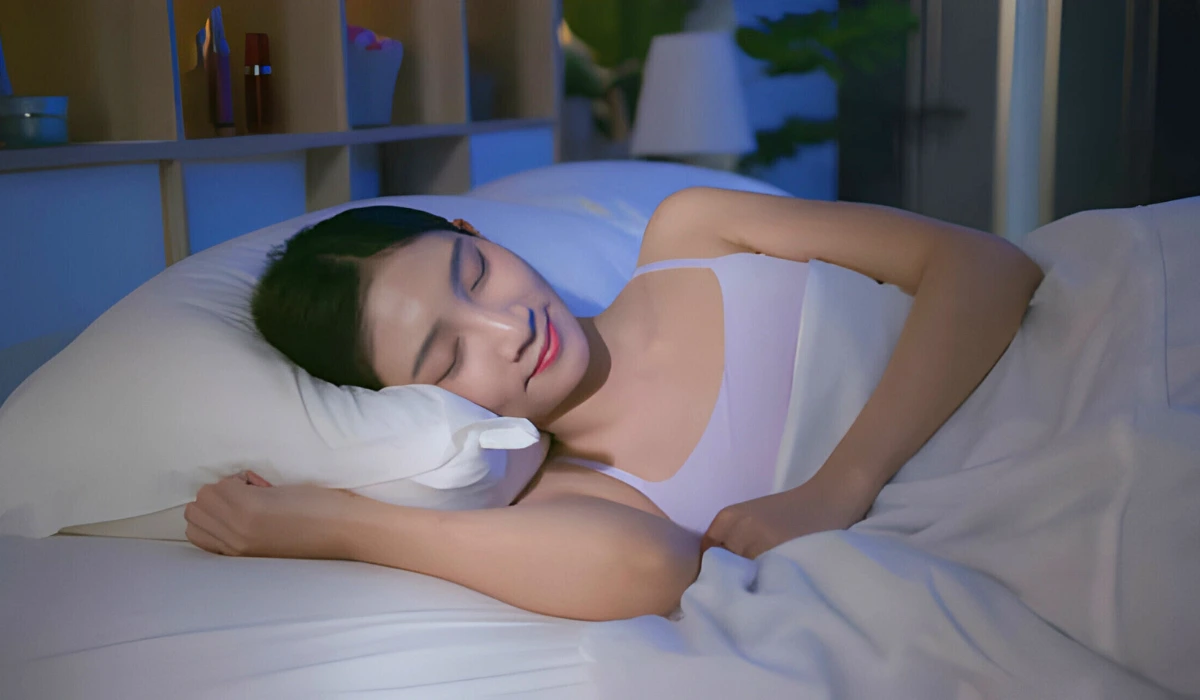You might have heard the expression, ‘beauty sleep’ and wondered whether it’s a real term. Does sleep improve your skin? Well, Yes, sleep has a direct correlation with the health of your skin. Researchers and dermatologists agree unanimously that restorative sleep has a profoundly positive impact on the skin. In this post, we will explore the extensive benefits of restorative sleep and how it impacts the health of our skin.
The Role of Sleep in Skincare

Yes, quality sleep significantly improves your skin. Well-rested people appear more attractive and relaxed. Because when sleeping, the body eliminates toxins and oxygenates itself.
On top of that, the body also releases growth hormones that promote the regeneration of skin cells. In contrast, poor sleep habits or reduced sleep badly impact the skin.
According to a study published in the National Library of Medicine, titled ‘Does poor quality sleep affect skin aging,’ researchers found out that sleep quality directly impacts the skin aging process. Sleep-deprived people have accelerated intrinsic skin aging processes, reduced skin barrier function, and diminished appearance.
Reduced sleep significantly diminishes our body’s ability to protect and rejuvenate skin cells, thereby impacting the overall appearance.
The Skin Performs Different Function During Day And Night
It might appear strange, but our skin fulfills different functions at various times of the day. The phenomenon is known as cutaneous chronobiology. It refers to the skin clock and helps us better understand our skin’s needs at different times of the day.
Over 24 hours, epidermis activities can be divided into four main phases;
- At the Time of Waking – The skin at this time lacks hydration and is susceptible to infections and other skin conditions. It needs to be dehydrated for better functioning.
- During daytime – The level of hydration in the skin gradually increases, which simultaneously boosts sebum levels. Sebum protects skin from damage and facilitates the transfer of antioxidants through sebaceous glands that protect against infections and Inflammation.
- In the Evening – By evening, the epidermis may have accumulated tons of pollutants and toxins that need to be eliminated. The melanin levels began to rise, and protect from UV damage,
- At Night – After a busy day acting as a protective barrier all day long against chemicals, toxins, and sun, the skin goes into repair mode at night. While you sleep, the skin repairs and regenerates itself and strengthens its protective barrier for the day ahead. That’s why a good night’s sleep is vital for skin to function properly.
Enhancing Skin Appearance: The Benefits of Restful Sleep
According to Sleepfoundation.org restful sleep is a powerful remedy for healthier skin. Sleeping enables the skin to regenerate and detox. Let’s take a look at the benefits of restful sleep;
Sleeping accelerates blood microcirculation which has profound effects on dark circles. It also facilitates the lymphatic drainage of the face. It results in glowing skin that attracts everyone.
Restorative sleep gives skin much-needed rest. While resting, the skin focuses on producing collagen and elastin. These are essential proteins that help the skin maintain elasticity, firmness, and suppleness
The skin barrier protects our skin from external stressors like UV rays, pollutants, and infections. When sleeping, our body repairs nourishes, and strengthens the skin barrier to ward off external damage.
While sleeping, our body also produces anti-inflammatory molecules thus reducing Inflammation. It also tackles the elevated levels of cortisol, the stress hormone. Thus, it eliminates skin inflammation, acne, and skin redness. Consequently, good sleep is particularly beneficial for people who suffer from skin conditions like psoriasis, acne, and rosacea.
Finally, during the nighttime, the skin is most receptive to care. At night, skin pores become enlarged making it more accessible to the evening skincare routine.
How Poor Sleeping Habits Impact Skin?
If quality sleep enhances the appearance of the skin, sleep deprivation does the opposite of it. Several studies have established the ill effects of poor sleep on the skin. If you don’t sleep well, here’s how its effect will manifest on the skin;
- Early Skin Aging – Good sleep is essential for the production of collagen in the skin. Poor sleep deprives the skin of the necessary collagen speeding the aging process.
- Dark Circle Under The Eyes – Inadequate sleep leads to poor blood circulation. It results in dark circles.
- Acne, Skin Inflammation, And Redness – Lack of sleep significantly enhances cortisol levels in the body. Cortisol is responsible for Inflammation in the body that can result in several skin conditions like acne and redness.
- Sensitive Skin – Sleep deprivations several impair the skin barrier function(. Without proper sleep, the skin has no time to rejuvenate kgs barrier function and overtimes its weakness. Consequently, the skin becomes prone to UV damage, sensitivity, and infections.
How To Have a Restful Sleep And Boost Skin Health?
Although, it’s long established that sleep plays a key role in the health of the skin. But people often fail to have a good night’s sleep. Here are some measures that can help you get a restful night’s sleep;
- Eat Healthy To Sleep Well – For restful sleep, researchers advise learning light and early. Ideally, have dinner two to three hours before sleep. Furthermore, including tryptophan-rich food (whole grains, bananas, almonds, etc.) promotes the production of sleep hormones.
- No Stimulating Drinks After 4 pm – Don’t take stimulants like lime tea, coffee, or caffeinated sodas after 4 pm. Caffeine in these drinks delays falling asleep.
- Don’t Overheat The Room – We all love a cost environment, but research indicates, that overheating the room can impact sleep cycles.
- Include Aromatherapy – Aromatherapy is found to promote calmness and good feelings. It reduces stress and helps you relax.
- Disconnects – Cut off any screen exposure well over half an hour before sleeping. Blue light from the screen is known to promote free radicals production which results in skin aging. Likewise, it also tricks the brain into believing it’s still daytime, which makes it challenging to fall asleep.
Summary – Quality Sleep is Essential For Beautifull Skin
Restful sleep is essential to have healthy skin. It allows the skin the time it needs to repair and rejuvenate itself and continue its protective functions. Therefore, if you wish to have glowing skin, it start with a Good Night’s Sleep.
References:
- Grandner A. Sleep, health, and society. Sleep Med Clin. 2017;12(1):1–22. doi: 10.1016/j.jsmc.2016.10.012 [PMC free article]
- Ferrara, M. and De Gennaro, L. (2001) How Much Sleep Do We Need? Sleep Medi-cine Reviews,5, 155-179

